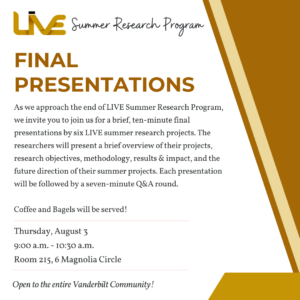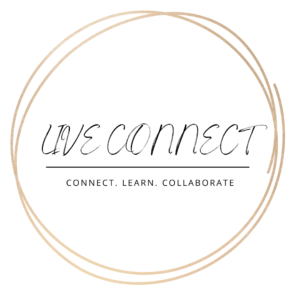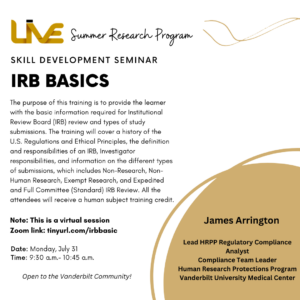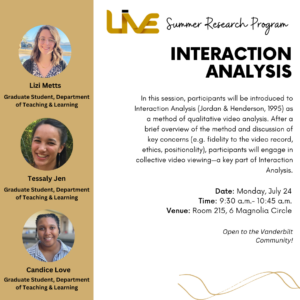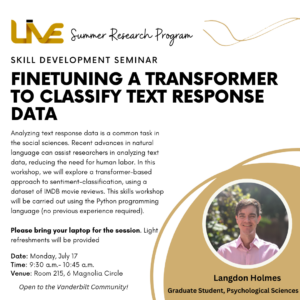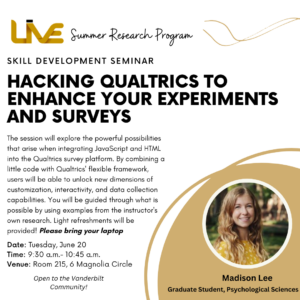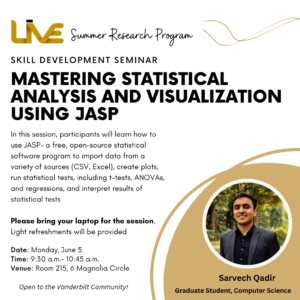Events
Upcoming LIVE Program and Events
LIVE Final Presentations
As we approach the end of LIVE Summer Research Program, we invite you to join us for a brief, ten-minute final presentations by six LIVE summer research projects. The researchers will present a brief overview of their projects, research objectives, methodology, results & impact, and the future direction of their summer projects. Each presentation will be followed by a seven-minute Q&A round. Coffee and Bagels will be served!
Continuing LIVE Programs and Events
LIVE Food For Thought
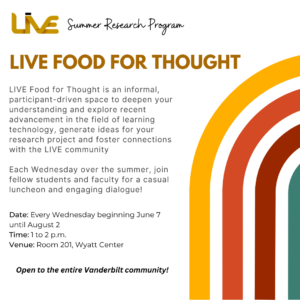
LIVE Food for Thought is an informal, participant-driven space to deepen your understanding and explore recent advancement in the field of learning technology, generate ideas for your research project and foster connections with the LIVE community Each Wednesday over the summer, join fellow students and faculty for a casual luncheon and engaging dialogue!
LIVE Weekly Skill Development Seminars
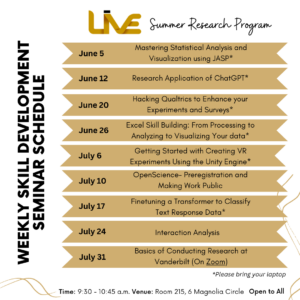
LIVE Summer Research Program is excited to host a series of weekly skill development seminars over the summer to enhance your research productivity and provide opportunities for personal and professional development. These highly interactive workshops are open to all students, faculty and staff, and will take place on Mondays (starting June 5 until July 31) from 9:30 to 10:45 a.m. in Room 215, 6 Magnolia Circle. Feel free to drop by for all or either one of them. No RSVP required. Light refreshments will be provided.
You can view the recording of the workshops here
Please find the details of the workshops below:
Mastering Statistical Analysis and Visualization using JASP (June 5): In this session, participants will learn how to use JASP- a free, open-source statistical software program to import data from a variety of sources (CSV, Excel), create plots, run statistical tests, including t-tests, ANOVAs, and regressions, and interpret results of statistical test. Please bring your laptop for the session
Research Application of ChatGPT (June 12): This session will explore what ChatGPT is, and why it has taken the world by storm. We will discuss the model’s strengths and limitations, and how researchers can leverage it towards conducting their own research, through an example from the instructor’s lab. The session will also have a live demonstration of ChatGPT’s capabilities. Lastly, for those interested, the instructor will provide code so that users can access ChatGPT programmatically without using the ChatGPT user interface. Please bring your laptop for the session
Hacking Qualtrics to Enhance Your Experiments and Surveys (June 20): The session will explore the powerful possibilities that arise when integrating JavaScript and HTML into the Qualtrics survey platform. By combining a little code with Qualtrics’ flexible framework, users will be able to unlock new dimensions of customization, interactivity, and data collection capabilities. You will be guided through what is possible by using examples from the instructor’s own research.
Excel Skill Building: From Processing to Analyzing to Visualizing Your Data (June 26): The session will cover basic building blocks in Excel. We will begin by discussing data structures, formulas, and manipulating data. Then, we will move on to visualizing and analyzing your data, using a variety of examples. Please bring your laptop for the session
Getting Started with Creating VR Experiments Using Unity Engine (July 3): Join this hands-on demo where you will learn about the basics of creating graphical applications with the Unity game engine, working with virtual reality equipment, and using those skills for research purposes. VR-capable laptops are welcome but not required.
Open Science- Preregistration and Making Work Public (July 10): The session will cover open science and specifically how to use OSF to preregister studies and share work. Participants will see an example of what a published project can look like on OSF – with public data and R code. Lastly, there will be a discussion on the open science movement as a whole and its potential drawbacks.
Finetuning a Transformer to Classify Text Response Data (July 17): Analyzing text response data is a common task in the social sciences. Recent advances in natural language can assist researchers in analyzing text data, reducing the need for human labor. In this workshop, we will explore a transformer-based approach to sentiment-classification, using a dataset of IMDB movie reviews. This skills workshop will be carried out using the Python programming language (no previous experience required). Please bring your laptop for the session.
Interaction Analysis (July 24): In this session, participants will be introduced to Interaction Analysis (Jordan & Henderson, 1995) as a method of qualitative video analysis. After a brief overview of the method and discussion of key concerns (e.g. fidelity to the video record, ethics, positionality), participants will engage in collective video viewing—a key part of Interaction Analysis.
Basics of Conducting Research at Vanderbilt (July 31): This session will take place via Zoom and will cover the basics of conducting research at Vanderbilt
LIVE Summer Research Program
To learn more about the LIVE Summer Research Program, click here
LIVE Connect
We are thrilled to announce the launch of our community building initiative: the LIVE Connect. This exciting program provides the Vanderbilt community with an opportunity to connect with other students, faculty and staff who share a common interest in exploring technology’s role in learning, through random pairings every month. Our vision through this program is to create an informal environment for connection, knowledge exchange, and collaboration at Vanderbilt
Here’s how it works:
- Register for the program: Sign up here by July 14
- Get matched: You will be randomly paired with two other individuals, forming a trio
- Arrange a meeting: Coordinate a convenient time, date, and location to meet for a 30, or 60-minute chat (virtual or in-person) to connect, discuss and learn from each another’s work and interests, and to explore avenues for collaboration
This program is a great opportunity if you are looking to connect with like-minded individuals, expand your network, enhance your knowledge and explore opportunities for collaboration in the field of learning technology
LIVE Lunch
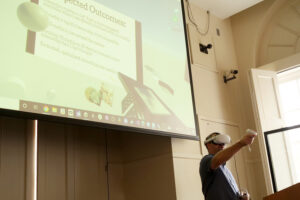
LIVE Lunch is intended to be a diverse series of presentations, interactions, and discussions each week. It includes traditional research presentations, but we will also be doing technology demos, design workshops, interaction analysis, external partner visits, and end-of-semester student flash talks.
IA Talk Series
The weekly IA Talk Series is held by the Vanderbilt Interaction Analysis Lab (VIAL), a collaboratively planned and run inter-generational, multi-institutional group that thinks deeply about interaction, learning, and power. In this series, participants from a variety of disciplines come together to share and think about methods, design, ethics, and the potential uses of video.
Past LIVE Programs and Events
IRB Basics
The purpose of this training is to provide the learner with the basic information required for Institutional Review Board (IRB) review and types of study submissions. The training will cover a history of the U.S. Regulations and Ethical Principles, the definition and responsibilities of an IRB, Investigator responsibilities, and information on the different types of submissions, which includes Non-Research, Non-Human Research, Exempt Research, and Expedited and Full Committee (Standard) IRB Review. All the attendees will receive a human subject training credit
Interaction Analysis
In this session, participants will be introduced to Interaction Analysis (Jordan & Henderson, 1995) as a method of qualitative video analysis. After a brief overview of the method and discussion of key concerns (e.g. fidelity to the video record, ethics, positionality), participants will engage in collective video viewing—a key part of Interaction Analysis
Finetuning a Transformer to Classify Text Response Data
Analyzing text response data is a common task in the social sciences. Recent advances in natural language can assist researchers in analyzing text data, reducing the need for human labor. In this workshop, we will explore a transformer-based approach to sentiment-classification, using a dataset of IMDB movie reviews. This skills workshop will be carried out using the Python programming language (no previous experience required). Please bring your laptop for the session.
Open Science- Preregistration and Making Work Public
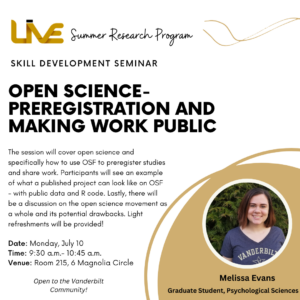
The session will cover open science and specifically how to use OSF to preregister studies and share work. Participants will see an example of what a published project can look like on OSF- with public data and R code. Lastly, there will be a discussion on the open science movement as a whole and its potential drawbacks.
LIVE Summer Research Interim Presentations
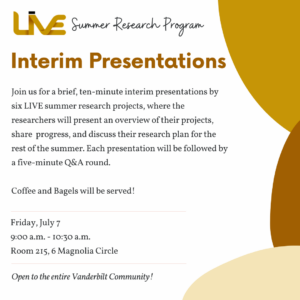
Join us for a brief, ten-minute interim presentations by six LIVE summer research projects, where the researchers will present an overview of their projects, share progress, and discuss their research plan for the rest of the summer. Each presentation will be followed by a five-minute Q&A round by the audience. Coffee and Bagels will be served! This event is open to all!
Getting Started with Creating VR Experiments Using the Unity Engine
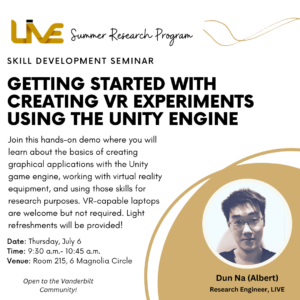
Join this hands-on demo where you will learn about the basics of creating graphical applications with the Unity game engine, working with virtual reality equipment, and using those skills for research purposes. Light refreshments will be provided! VR capable laptops are welcome but not required.
Excel Skill Building: From Processing to Analyzing to Visualizing Your Data
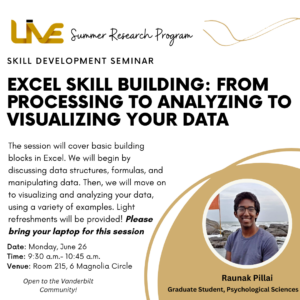
The session will cover basic building blocks in Excel. We will begin by discussing data structures, formulas and manipulating data. Then, we will move on to visualizing and analyzing your data, using a variety of examples. Light refreshments will be provided! Please bring your laptop for the session
Hacking Qualtrics to Enhance Your Experiments and Surveys
In this session, participants will explore the powerful possibilities that arise when integrating JavaScript and HTML into the Qualtrics survey platform. By combining a little code with Qualtrics’ flexible framework, users will be able to unlock new dimensions of customization, interactivity, and data collection capabilities. You will be guided through what is possible by using examples from the instructor’s own research. Please bring your laptop for the session
Research Application of ChatGPT
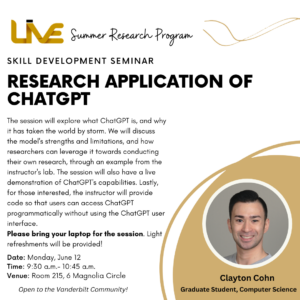
The session will explore what ChatGPT is, and why it has taken the world by storm. We will discuss the model’s strengths and limitations, and how researchers can leverage it towards conducting their own research, through an example from the instructor’s lab. The session will also have a live demonstration of ChatGPT’s capabilities. Lastly, for those interested, the instructor will provide code so that users can access ChatGPT programmatically without using the ChatGPT user interface. Please bring your laptop for the session.
Skill Development Seminar: Mastering Statistical Analysis and Visualization using JASP
In this session, participants will learn how to use JASP- a free, open-source statistical software program to import data from a variety of sources (CSV, Excel), create plots, run statistical tests, including t-tests, ANOVAs, and regressions, and interpret results of statistical test. Please bring your laptop for the session
Workshop on Utilizing Digital Archives for Storytelling Purposes
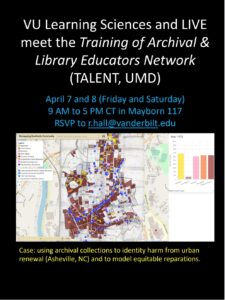
We invite you to participate in an engaging two-day workshop on April 7 and 8 in collaboration with Training of Archival & Library Educators (TALENT) network and VU Learning Sciences, which will focus on the utilization of digital archives for storytelling purposes. The workshop will briefly delve into the techniques for employing digital archives, as well as the process of constructing them from a diverse array of materials, including documents, artifacts, and other items requiring digitization.
Furthermore, the workshop will examine the concept of storytelling through the lens of digital archives and discuss the essential computational tools needed to effectively analyze and interpret the data. To provide a concrete example, a case study from Asheville, North Carolina will be presented, which is currently in progress. This project utilizes information to create models and align data, identifying individuals adversely affected by urban renewal. Subsequently, the degree of harm is quantified for a public commission that is investigating potential reparations for damages stemming from the urban renewal initiatives.
If you are interested in becoming a part of this two-day workshop, please email Dr. Rogers Hall at r.hall@vanderbilt.edu or sign up here
